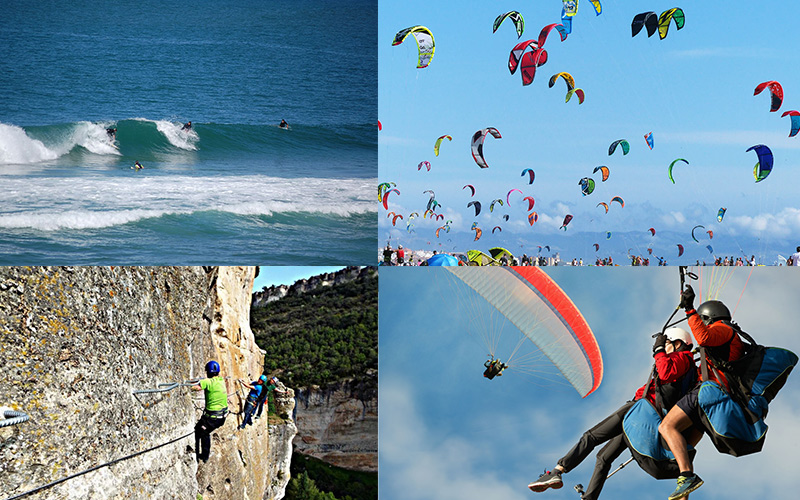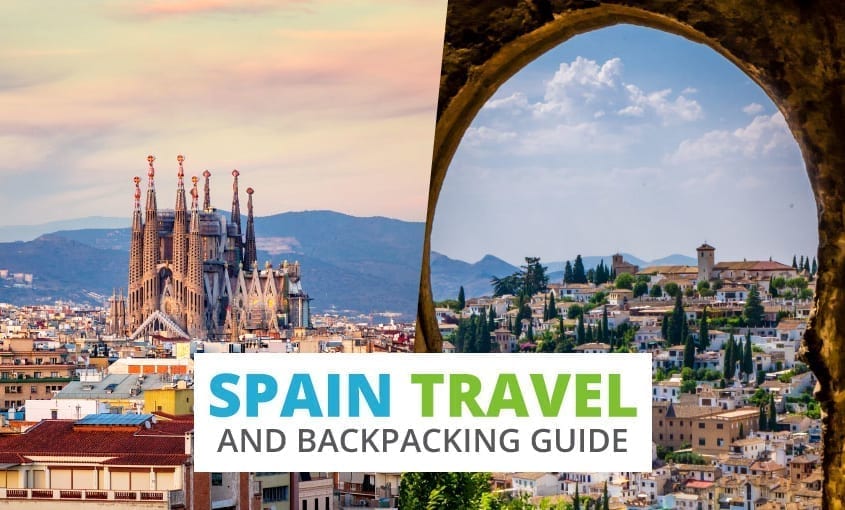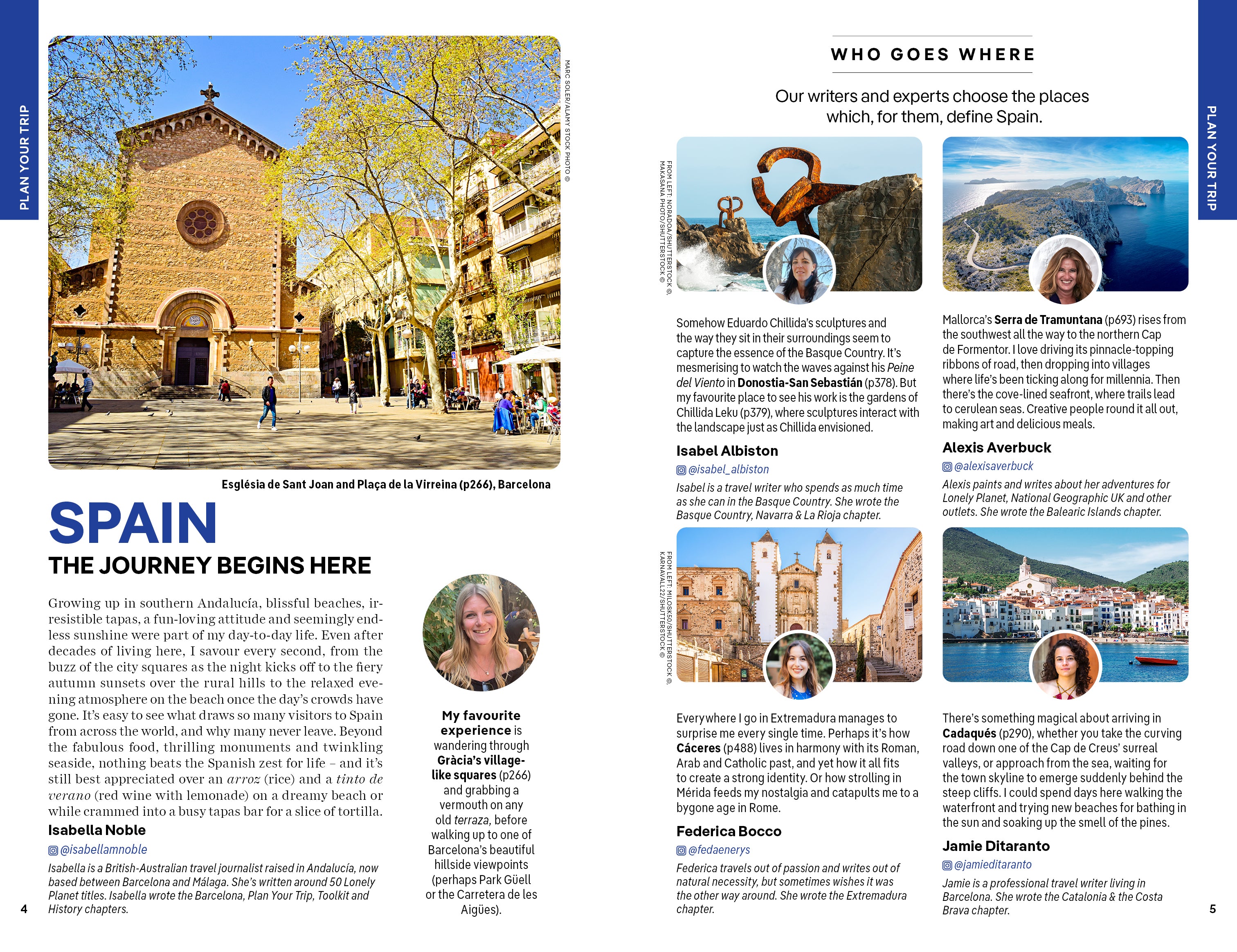
Introduction
Overview of Spain as a Travel Destination
Spain, a vibrant tapestry of culture, history, and stunning landscapes, beckons travelers from around the globe. Whether wandering through Moorish palaces in Andalusia or soaking up the Mediterranean sun on the beaches of Valencia,
- Rich traditions and festivals
- Diverse culinary experiences
- Iconic architecture and art
await every explorer.
Purpose of the Travel Guide
This travel guide aims to equip you with essential information for your unforgettable Spanish adventure. From local customs to must-visit attractions, you’ll find everything needed to craft your perfect itinerary, ensuring a smooth and enriching experience.

Planning Your Trip to Spain
Best Time to Visit Spain
When planning a trip to Spain, consider the time of year to optimize your experience. Spring (April to June) and fall (September to October) are ideal for pleasant weather, colorful festivals, and fewer crowds.
- Blooming festivals
- Mild temperatures
- Cultural events
Summer may be sultry in cities like Seville, while winter offers unique regional charm.
Visa Requirements and Travel Documents
Before packing your bags, check if you require a visa. Most European Union citizens need only a valid passport, while other nationalities may need a Schengen Visa. Be sure to have the following:
- Valid passport (valid for at least six months)
- Travel insurance coverage
- Round-trip flight confirmation
Planning ahead ensures a stress-free departure.
Currency and Money Tips
Spain uses the Euro (€). To save on exchange fees, consider withdrawing cash from ATMs or using a no-foreign transaction credit card. Remember:
- Notify your bank about your travel plans.
- Keep some cash for small shops and markets.
- Check for hidden fees when withdrawing cash.
Being financially prepared can enhance your travel experience, allowing you to focus on discovering Spain’s treasures.

Regions of Spain to Explore
Andalusia
Andalusia, home to flamenco music and Moorish architecture, offers a glimpse into Spain’s rich cultural heritage. Visit stunning cities like Seville and Granada, where the intricate Alhambra shines. Don’t miss:
- The lively Feria de Abril (April Fair)
- Tapas hopping in local bars
Catalonia
Catalonia proudly showcases its unique identity, breathtaking coastlines, and vibrant art scene. Barcelona, with Antoni Gaudí’s masterpieces like the Sagrada Familia, captivates visitors. Embrace the region’s allure by exploring:
- Stunning beaches along the Costa Brava
- The historic streets of Girona
Madrid
As Spain’s capital, Madrid is a bustling hub of culture, history, and nightlife. The Prado Museum and Retiro Park offer serene escapes amidst the city’s energy. Experience:
- Authentic dining at Mercado de San Miguel
- Exciting flamenco shows in the heart of the city
Basque Country
This unique region boasts a distinct culture and language, along with dramatic landscapes. Discover the culinary delights of San Sebastián, known for its pintxos. Key highlights include:
- Breathtaking coastal views at Zumaia
- The annual San Sebastián International Film Festival
Valencia
Famed for its future-forward architecture alongside historic sites, Valencia is a blend of old and new. Celebrate its culinary fame with world-renowned paella. Explore:
- The futuristic City of Arts and Sciences
- The lively Las Fallas festival in March
These regions, each with its own flavor, promise unforgettable experiences that will enrich any traveler’s itinerary.

Top Attractions in Spain
The Alhambra in Granada
A visit to Spain is incomplete without experiencing the Alhambra, a stunning palatial fortress brimming with history. Nestled against the Sierra Nevada, this UNESCO World Heritage Site dazzles with:
- Intricate Islamic architecture
- Lush gardens of the Generalife
Make sure to reserve tickets in advance to avoid long lines!
Sagrada Familia in Barcelona
The Sagrada Familia, an architectural wonder designed by Antoni Gaudí, has been under construction since 1882. Its towering spires and detailed facades are awe-inspiring. Highlights include:
- The colorful stained glass that bathes the interior in light
- Guided tours offering insights into Gaudí’s vision
Take your time to appreciate the unique blend of Gothic and Art Nouveau styles.
Prado Museum in Madrid
For art lovers, the Prado Museum is a must-visit. Home to an extensive collection of European masterpieces, it showcases works by artists like Velázquez and Goya. Visitor favorites include:
- The iconic “Las Meninas” by Velázquez
- Goya’s thought-provoking “The Third of May 1808”
Be sure to set aside several hours to fully immerse yourself in the art.
Ibiza’s Beaches
While known for its vibrant nightlife, Ibiza also boasts incredible beaches. From tranquil coves to lively shores, there’s something for everyone. Explore:
- Cala Comte for stunning sunset views
- Talamanca Beach for family-friendly relaxation
A beach day is essential for unwinding after bustling city explorations.
La Tomatina Festival in Buñol
For a unique cultural experience, plan your trip around the La Tomatina festival. Held in Buñol every August, this tomato-throwing extravaganza is wild and messy:
- Join thousands of participants in a fun, friendly battle
- Enjoy live music and local festivities afterwards
Make your memories unforgettable by diving into the experience headfirst!
With such a diverse array of attractions, Spain ensures every traveler finds something that resonates with their interests and spirit.

Spanish Cuisine and Dining Experiences
Tapas Culture
One of the most delightful ways to experience Spain is through its vibrant tapas culture. Small plates of delicious bites encourage socializing and sharing among friends. When you’re in Spain, don’t miss:
- Patatas bravas : Spicy potatoes with aioli.
- Jamón ibérico : Cured ham showcasing rich flavors.
- Gambas al ajillo : Garlic shrimp that are simply irresistible.
Casually hopping between tapas bars allows for endless exploration of the country’s culinary treasures.
Paella and Other Traditional Dishes
Another iconic dish, paella, hails from Valencia. This rice-based meal can be prepared with various ingredients like seafood, chicken, or vegetables. Don’t forget to try:
- Fideuà : A noodle version of paella that’s just as tasty.
- Cocido : A hearty stew popular in different regions.
In every corner of Spain, you’ll discover regional specialties that reflect the local culture and ingredients.
Wine Regions of Spain
Spain is a wine lover’s paradise, with regions like Rioja and Ribera del Duero producing world-class wines. When sipping Spanish wines, be sure to explore:
- Tempranillo : A robust red perfect for pairing with tapas.
- Albariño : A crisp white from Galicia, great with seafood.
Visiting vineyards for tastings can immerse you in the local winemaking process, providing an unforgettable experience to complement your culinary journey.
Indulging in Spanish cuisine is a flavorful adventure that invites you to taste, share, and explore, making each meal an integral part of your travel experience.

Outdoor Activities and Adventures
Hiking in the Pyrenees
For outdoor enthusiasts, the Pyrenees mountains offer breathtaking trails and stunning vistas. Whether you’re a seasoned hiker or a beginner, there’s something for everyone. Don’t miss:
- Ordesa Valley : Known for its dramatic cliffs and waterfalls.
- Aneto Peak : The highest point in the Pyrenees, perfect for seasoned climbers.
Explore the tranquil beauty of this region while savoring the fresh mountain air.
Surfing in San Sebastian
If you crave sun, sand, and surf, head to San Sebastian, a popular surfing destination. La Zurriola Beach is ideal for both beginners and experienced surfers. Here’s what to expect:
- Surf schools : Offering lessons for all levels, ensuring a fun introduction to the sport.
- Vibrant surf culture : Explore beachfront bars and cafes where surfers unwind after catching waves.
The thrill of riding the waves amidst scenic coastal views is simply unforgettable.
Camino de Santiago Pilgrimage
The Camino de Santiago, a pilgrimage route, draws adventurers from around the world. This spiritual and physical journey leads to Santiago de Compostela, renowned for its historic cathedral. Key aspects include:
- Multiple routes : Choose from the popular Camino Francés or the scenic Camino del Norte.
- Camaraderie : Meet fellow pilgrims from diverse backgrounds as you traverse picturesque villages and stunning landscapes.
Walking this iconic path not only offers breathtaking views but also a profound sense of connection and reflection.
Engaging in outdoor adventures allows travelers to experience the natural beauty of Spain while embracing a sense of exploration and connection to the land.

Cultural Experiences in Spain
Flamenco Shows
Embrace the passionate spirit of Spain by attending a flamenco show, a traditional art form that combines music, dance, and song. You’ll be captivated by:
- Powerful performances : Talented dancers clad in vibrant costumes.
- Emotional storytelling : Each dance tells a unique tale of love and heartache.
Venues in Seville and Granada often host intimate performances, offering a true sense of the culture.
Bullfighting Traditions
While bullfighting remains a controversial tradition, it represents a significant aspect of Spanish cultural heritage. Major cities celebrate this art form. Key points to consider:
- Plazas de toros : Historical arenas where events take place.
- Cultural significance : Understand the rituals and artistry involved before attending.
Respectful engagement with this tradition can provide deeper insights into Spain’s complexities.
Festivals and Celebrations
Spain’s calendar is packed with vibrant festivals that reflect its diverse cultural fabric. From La Tomatina to Semana Santa (Holy Week), there’s something for everyone:
- Las Fallas in Valencia : Celebrate with fireworks and massive puppets.
- San Fermín in Pamplona : Experience the thrill of the running of the bulls.
Participating in these festivities is a lively way to connect with locals and immerse yourself in the energy of the country.
These cultural experiences help travelers appreciate the rich heritage of Spain, ensuring that every visit is filled with unforgettable memories and connections.

Practical Tips for Traveling in Spain
Transportation in Spain
Navigating Spain is a breeze, thanks to its efficient transportation system. From high-speed trains to local buses, travelers have many options. Here are some highlights:
- Renfe trains : Fast and comfortable, perfect for intercity travel.
- Metro systems : Major cities like Madrid and Barcelona offer extensive metro networks for easy access.
Purchasing a transport pass can save money and streamline your adventures.
Language and Communication
While Spanish is the primary language, regional languages like Catalan and Basque are also spoken in their respective areas. Here are a few tips to enhance communication:
- Basic phrases : Learning simple Spanish phrases can go a long way. For example, “Por favor” (please) and “Gracias” (thank you).
- Translation apps : Use smartphone applications to help bridge language barriers when needed.
Engaging with locals and attempting to converse in their language can foster goodwill.
Safety and Emergency Contacts
Spain is generally a safe country for travelers, though it’s wise to stay vigilant. Here are key safety tips:
- Stay aware of your surroundings : Keep an eye on your belongings, especially in tourist areas.
- Emergency contacts : In case of an emergency, dial 112 for police, fire, or medical assistance.
Keeping important contact numbers readily available ensures peace of mind during your travels.
With these practical tips, navigating Spain becomes an easier and more enjoyable experience, allowing travelers to immerse themselves fully in the vibrant culture and breathtaking landscapes.

Accommodation Options in Spain
Hotels and Resorts
Spain offers a wide range of hotels and resorts catering to various budgets and preferences. From luxury beachfront resorts in Costa del Sol to boutique hotels in historic city centers, travelers can find the perfect spot to unwind. Consider:
- Boutique hotels : Unique, stylish accommodations often found in vibrant neighborhoods.
- All-inclusive resorts : Perfect for families looking for convenience and entertainment options.
Many hotels and resorts provide exceptional amenities, such as spas and gourmet dining, enhancing your travel experience.
Hostels and Guesthouses
For budget-conscious travelers, hostels and guesthouses present affordable yet charming options. These are great for meeting fellow adventurers and immersing yourself in local culture. Keep an eye out for:
- Social events : Many hostels organize group activities, fostering camaraderie among guests.
- Private rooms : Ideal for couples or those seeking a bit more privacy.
I fondly recall staying in a guesthouse in Granada, where the owner shared wonderful local tips over breakfast with fellow travelers.
Vacation Rentals and Homestays
For those wanting a home-like experience, vacation rentals and homestays provide an excellent alternative. Options include:
- Airbnb and similar platforms : Offering a variety of spaces, from apartments to villas.
- Homestays : Staying with a local family can enrich your cultural understanding.
Staying in a local neighborhood in Barcelona gave me an authentic taste of daily life, from market visits to evening strolls.
By exploring various accommodation options, travelers can find the ideal place that not only suits their needs but also enhances their overall experience in Spain.

Shopping and Souvenirs in Spain
Popular Shopping Destinations
Shopping in Spain is an exciting adventure filled with unique finds and vibrant marketplaces. Major cities like Madrid and Barcelona boast famous shopping districts. Highlights include:
- Gran Via in Madrid : Bustling streets lined with international brands and local boutiques.
- Passeig de Gràcia in Barcelona : Known for luxury boutiques and stunning architecture.
Don’t forget to explore local markets, such as El Raval’s vintage shops in Barcelona or the Mercado de San Miguel in Madrid for artisanal food products.
Unique Spanish Souvenirs
When it comes to souvenirs, Spain offers a variety of memorable items that reflect its rich culture. Consider bringing home:
- Ceramics from Andalusia : Beautifully crafted pottery showcases traditional designs and vibrant colors.
- Fans (abanicos) : Hand-painted fans are not only practical in the heat but also make stunning decorative pieces.
- Flamenco dresses and accessories : These colorful garments capture the spirit of Spanish dance and culture.
During my trip to Seville, I picked up a handmade pottery bowl that reminds me of the vibrant markets I explored.
Whether indulging in retail therapy in cosmopolitan cities or seeking unique souvenirs at local markets, shopping in Spain is a delightful way to connect with its rich culture and bring a piece of it home.

Sustainable Travel Practices in Spain
Eco-friendly Accommodation Choices
Traveling sustainably in Spain starts with your choice of accommodation. Fortunately, the country offers a variety of eco-friendly options that minimize environmental impact. Consider:
- Green Hotels : Look for accommodations with EcoCert or Green Key certifications, which ensure sustainability practices.
- Rural Retreats : Many agriturismos (farm stays) promote eco-conscious living and provide organic produce straight from their gardens.
During my stay at an eco-friendly hotel in Valencia, I appreciated the efforts they made to reduce waste and conserve energy, which added to the overall experience.
Responsible Tourism Initiatives
Beyond accommodations, Spain has robust initiatives aimed at promoting responsible tourism. Travelers can participate by:
- Supporting local businesses : Invest in small shops, restaurants, and artisans, keeping money within the community.
- Joining guided eco-tours : These tours educate visitors about local ecosystems and wildlife while minimizing their footprint.
I joined an eco-tour in the Costa Brava that focused on local biodiversity, which not only enriched my understanding of the region but also supported conservation efforts.
Embracing sustainable travel practices helps preserve the beauty of Spain for future generations while providing a richer, more authentic travel experience.

XII. Conclusion and Final Recommendations
Recap of Spain’s Highlights
Spain offers a wealth of experiences, from breathtaking landscapes and rich history to vibrant cultures and delectable cuisines. Key highlights include:
- Iconic monuments : The Alhambra, Sagrada Familia, and Prado Museum.
- Diverse regions : Each area, from Andalusia to Catalonia, boasts unique traditions and flavors.
Every visit to Spain promises an unforgettable journey filled with distinct moments and memories.
Tips for a Memorable Trip
To ensure your travel experience is as enriching as possible, consider these practical tips:
- Plan your itinerary : Balance your schedule between cultural attractions and leisure time to soak in the atmosphere.
- Engage with locals : Try to learn a few basic Spanish phrases; it opens doors to deeper connections.
- Be adventurous : Step off the beaten path to discover hidden gems, like local markets or lesser-known neighborhoods.
Personally, wandering through the narrow streets of a quaint village in the Basque Country allowed me to experience the warmth of local hospitality, making my trip all the more special.
With these highlights and recommendations in mind, you’re well-equipped to explore Spain’s vibrant culture, stunning landscapes, and rich history. Enjoy every moment as you create your own unforgettable Spanish adventure!













